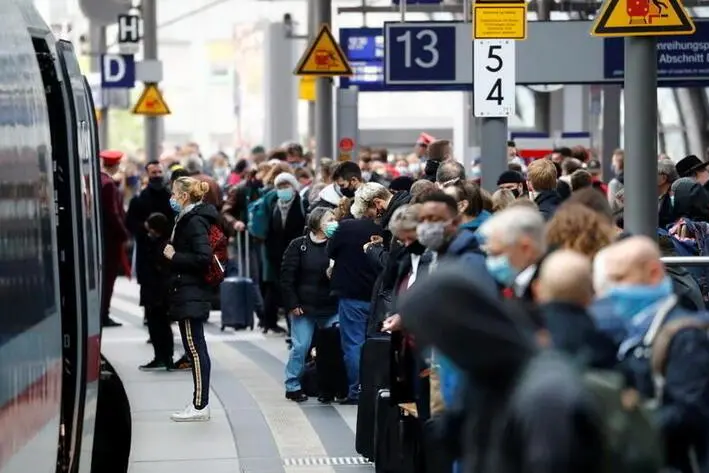PHOTO
(The author is a Reuters Breakingviews columnist. The opinions expressed are her own.)
LONDON - Europe is taking up Covid-19 target practice. With infection rates soaring, Germany is considering following other countries in imposing movement restrictions on the unvaccinated. Such measures are harsh and unpopular but deliver results. Most importantly, they reduce the risk of wider economic damage from blanket lockdowns.
The continent is once again in the eye of the viral storm. Last week, Europe accounted for more than half the new infections globally and half the deaths, according to Reuters data. Austria responded on Monday with a targeted lockdown on the 2 million of its 9 million citizens who have yet to get a jab. By contrast, the government in the Netherlands decided to set an 8 p.m. curfew on restaurants and bars. Dutch football matches are once again being played in empty stadiums.
Austria’s approach is supported by evidence: wielding the vaccine stick works. France’s decision to restrict indoor dining to people who are fully vaccinated or with a recent negative test result lifted its double-dose inoculation rate from a paltry 32% in July to 68% in November. U.S. President Joe Biden’s vaccine mandate for healthcare workers, government employees and those working for larger companies also helped boost inoculation rates to 58% from 48%.
It’s also clear something has to be done. Germany’s and Austria’s double-vaccination rates have remained stubbornly flat at around 67% and 63% respectively. Crucially, that’s below the 70% scientists reckon is the threshold for herd immunity. With 73% of its population fully inoculated and attention now focused on booster shots, Italy’s infection rates are under control. In Austria and Germany they’re not – and patients, most of them unvaccinated, are filling up intensive care wards. In Germany’s Saxony, 85% of ICU beds are occupied.
If hospitals start running out of beds, national lockdowns become unavoidable. But school closures, work-from-home orders and shuttered restaurants and bars carry a hefty economic price. Shares in airlines like easyJet, Ryanair and Deutsche Lufthansa have lost 10% or more in the last couple of weeks, a combined 3.5 billion euros of market value. Reluctant finance ministers will also have to reach into their pockets once more to support affected workers. No matter how uncomfortable the optics, pressuring vaccine holdouts to get jabbed up is the easier and cheaper option.
CONTEXT NEWS
- Leaders of Germany’s 16 federal states will meet on Nov. 18 to discuss responses to a new surge in Covid-19 cases.
- Several regions, including the capital, Berlin, have already introduced rules that effectively exclude non-vaccinated people from venues such as cinemas, hairdressers, restaurants and fitness studios.
- Belgium tightened its coronavirus restrictions on Nov. 17, mandating wider use of masks and enforcing work from home, as cases spiked in the country’s fourth Covid-19 wave.
- Austria imposed a lockdown on those unvaccinated against the coronavirus on Nov. 15. Vienna said that roughly 2 million of Austria’s 9 million people were now allowed to leave their homes only for limited reasons like travelling to work or shopping for essentials.
- France, the Netherlands and many countries in Eastern Europe are also experiencing a surge in infections.
(The author is a Reuters Breakingviews columnist. The opinions expressed are her own.)
(Editing by Ed Cropley and Oliver Taslic) ((For previous columns by the author, Reuters customers can click on DONNELLAN/ SIGN UP FOR BREAKINGVIEWS EMAIL ALERTS https://bit.ly/BVsubscribe | Aimee.Donnellan@thomsonreuters.com; Reuters Messaging: Aimee.Donnellan.thomsonreuters.com@reuters.net))





















